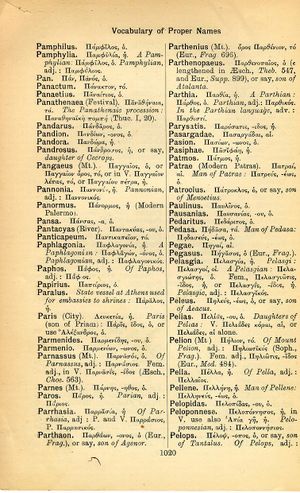Pandion: Difference between revisions
Περὶ τοῦ ἐπέκεινα τοῦ νοῦ κατὰ μὲν νόησιν πολλὰ λέγεται, θεωρεῖται δὲ ἀνοησίᾳ κρείττονι νοήσεως → On the subject of that which is beyond intellect, many statements are made on the basis of intellection, but it may be immediately cognised only by means of a non-intellection superior to intellection
(Gf-D_6) |
(3_9) |
||
| Line 8: | Line 8: | ||
{{Gaffiot | {{Gaffiot | ||
|gf=<b>Pandīōn</b>,¹⁶ ŏnis, m. (Πανδίων), nom de divers personnages, not<sup>t</sup> :<br /><b>1</b> [[Pandion]] [fils d’Érechthée, père de Procné et de Philomèle] : Ov. M. 6, 426 ; Lucr. 6, 1143<br /><b>2</b> fils de Jupiter et de la Lune : Hyg. Fab. præf.<br /><b>3</b> roi de l’Inde au temps d’Auguste : Plin. 6, 23<br /><b>4</b> le rossignol : Ov. P. 1, 3, 39 ; Mart. 1, 26, 3. | |gf=<b>Pandīōn</b>,¹⁶ ŏnis, m. (Πανδίων), nom de divers personnages, not<sup>t</sup> :<br /><b>1</b> [[Pandion]] [fils d’Érechthée, père de Procné et de Philomèle] : Ov. M. 6, 426 ; Lucr. 6, 1143<br /><b>2</b> fils de Jupiter et de la Lune : Hyg. Fab. præf.<br /><b>3</b> roi de l’Inde au temps d’Auguste : Plin. 6, 23<br /><b>4</b> le rossignol : Ov. P. 1, 3, 39 ; Mart. 1, 26, 3. | ||
}} | |||
{{Georges | |||
|georg=Pandīōn, onis, Akk. ona, m. ([[Πανδίων]]; Pandĭon [[gemessen]] b. Avien. descr. orb. 1218), [[König]] in Athen, [[Vater]] der Prokne u. [[Philomela]] ([[von]] denen [[erstere]] in eine [[Schwalbe]], [[letztere]] in eine [[Nachtigall]] verwandelt wurde), Ov. [[met]]. 6, 426 u. (Akk.) 676: Pandionis [[populus]], Lucr. 6, 1141: Cecropiae Pandionis arces, Athen, Mart. 1, 25, 3: Pandione [[nata]] = Prokne, Ov. [[met]]. 6, 636; od. = [[Philomela]], Ov. ex Pont. 1, 3, 39. – Dav. Pandīonius, a, um, pandionisch, [[des]] [[Pandion]], [[auch]] poet. = athenisch, [[Athenae]], Ov. [[met]]. 15, 430: volucres, [[Schwalbe]] und [[Nachtigall]], Sen. poët.: arces, Athen, Claud.: [[cavea]], [[Theater]] zu Athen, [[Sidon]]. | |||
}} | }} | ||
Revision as of 09:31, 15 August 2017
English > Greek (Woodhouse)
Πανδίων, -ονος, ὁ.
Latin > English (Lewis & Short)
Pandīon: ŏnis, m., = Πανδίων.
I A king of Athens, father of Progne and Philomela, Hyg. Fab. 48; Ov. M. 6, 426; 676: Pandionis populus, i. e. the Athenians, Lucr. 6, 1143: Pandione nata, i. e. Progne, Ov. M. 6, 634.—Transf., for the nightingale, Ov. P. 1, 3, 39: Cecropiae Pandionis arces, Mart. 1, 26, 3.—Hence,
B Pandīŏnĭus, a, um, adj., Pandionian: Pandioniae Athenae, Ov. M. 15, 430: Pandionia Orithyia, the sister of Pandion, Prop. 1, 20, 31: res Pandioniae, the Athenian state, Claud. IV. Cons. Honor. 506: arces, the citadel of Athens, id. Rapt. Pros. 2, 19; also called mons, Stat. Th. 2, 720: volucres, the nightingale and the swallow, Sen. Octav. 8: cavea, the Athenian theatre, Sid. Carm. 23, 137.—
II A son of Jupiter and Luna, Hyg. Fab. praef.
Latin > French (Gaffiot 2016)
Pandīōn,¹⁶ ŏnis, m. (Πανδίων), nom de divers personnages, nott :
1 Pandion [fils d’Érechthée, père de Procné et de Philomèle] : Ov. M. 6, 426 ; Lucr. 6, 1143
2 fils de Jupiter et de la Lune : Hyg. Fab. præf.
3 roi de l’Inde au temps d’Auguste : Plin. 6, 23
4 le rossignol : Ov. P. 1, 3, 39 ; Mart. 1, 26, 3.
Latin > German (Georges)
Pandīōn, onis, Akk. ona, m. (Πανδίων; Pandĭon gemessen b. Avien. descr. orb. 1218), König in Athen, Vater der Prokne u. Philomela (von denen erstere in eine Schwalbe, letztere in eine Nachtigall verwandelt wurde), Ov. met. 6, 426 u. (Akk.) 676: Pandionis populus, Lucr. 6, 1141: Cecropiae Pandionis arces, Athen, Mart. 1, 25, 3: Pandione nata = Prokne, Ov. met. 6, 636; od. = Philomela, Ov. ex Pont. 1, 3, 39. – Dav. Pandīonius, a, um, pandionisch, des Pandion, auch poet. = athenisch, Athenae, Ov. met. 15, 430: volucres, Schwalbe und Nachtigall, Sen. poët.: arces, Athen, Claud.: cavea, Theater zu Athen, Sidon.

